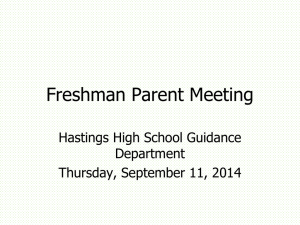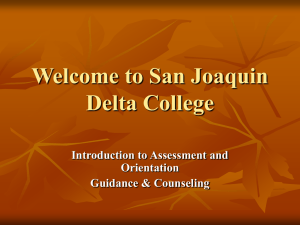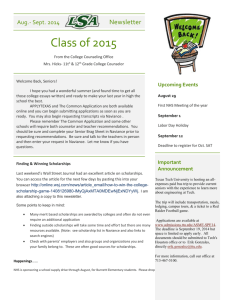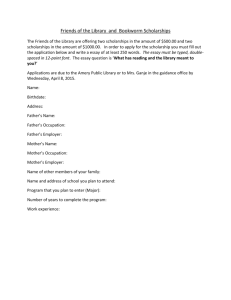The junior year is the time that student should seriously begin to
advertisement
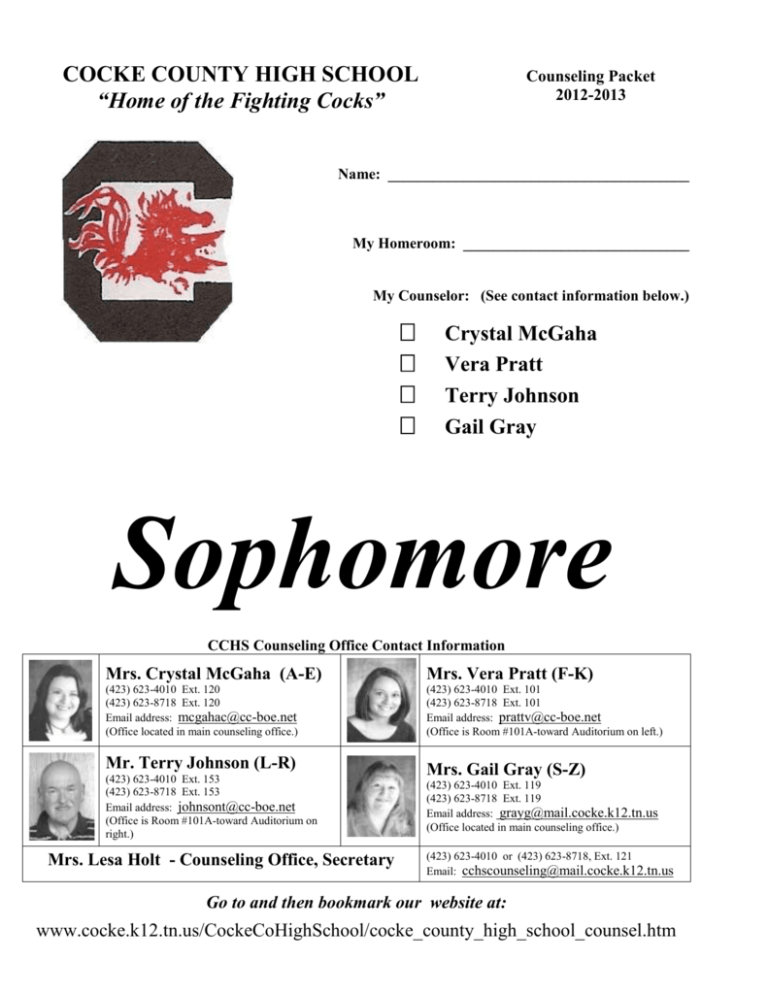
COCKE COUNTY HIGH SCHOOL “Home of the Fighting Cocks” Counseling Packet 2012-2013 Name: ________________________________________ My Homeroom: ______________________________ My Counselor: (See contact information below.) ___________________________ Crystal McGaha Vera Pratt Terry Johnson Gail Gray Sophomore CCHS Counseling Office Contact Information Mrs. Crystal McGaha (A-E) Mrs. Vera Pratt (F-K) (423) 623-4010 Ext. 120 (423) 623-8718 Ext. 120 Email address: mcgahac@cc-boe.net (Office located in main counseling office.) (423) 623-4010 Ext. 101 (423) 623-8718 Ext. 101 Email address: prattv@cc-boe.net (Office is Room #101A-toward Auditorium on left.) Mr. Terry Johnson (L-R) (423) 623-4010 Ext. 153 (423) 623-8718 Ext. 153 Email address: johnsont@cc-boe.net (Office is Room #101A-toward Auditorium on right.) Mrs. Lesa Holt - Counseling Office, Secretary Mrs. Gail Gray (S-Z) (423) 623-4010 Ext. 119 (423) 623-8718 Ext. 119 Email address: grayg@mail.cocke.k12.tn.us (Office located in main counseling office.) (423) 623-4010 or (423) 623-8718, Ext. 121 Email: cchscounseling@mail.cocke.k12.tn.us Go to and then bookmark our website at: www.cocke.k12.tn.us/CockeCoHighSchool/cocke_county_high_school_counsel.htm SOPHOMORE CONFERENCE OBJECTIVES: Recall requirements needed and analyze credits completed in order to assess progress toward promotion/graduation. 1.7 Apply knowledge of personal abilities, work habits, skills, interests, and values to career choices. (Interest inventory results from PLAN test) 4.1 Recognize effective study/time management skills and how they relate to success. Assess individual habits/success. 3.1, 1.3 Investigate website/materials to locate information about career clusters and jobs (TCIDS, College for TN) (Hand out current job outlook). 4.2, 6.7, 5.1, 5.3 Evaluate how interests, abilities, achievement relate to attaining personal, social, academic and career goals (testing, scholarships, etc). 4.4, 6.1 Standards targeted: 1.3, 3.1, 4.1, 4.2, 6.7, 5.1, 5.3, 4.4, 6.1 CCHS Counseling Mission Statement The mission of the Cocke County High School Counseling Department is to partner with all stakeholders (educators, parents/guardians, students and community members) in order to facilitate a support system which will ensure all students at CCHS have access to and are prepared with the knowledge and skills needed to become productive citizens and lifelong learners. During your SOPHOMORE year, you need to complete (or, at least, keep in mind) the following items. By doing so, not only will you feel more informed, but also, better prepared as your graduation grows closer. Also, this year should be a YEAR OF PERSONAL GROWTH. In addition to working hard in school and being involved in a variety of activities, TRY TO IDENTIFY YOUR ABILITIES, INTERESTS, AND APTITUDES as you START EXAMINING FUTURE CAREER CHOICES. Look for opportunities to further develop your skills and talents. Continue to keep track of the classes you need and the grades that you receive. - By the end of your sophomore year, you have completed four of eight semesters that make up your high school career. You’re HALF of the way through! Now, mistakes are going to be harder to correct, but still can be—it may just take more time and effort. - Remember, you need _28_ total credits to graduate. Work hard to earn all of the credits you need by passing all of your courses, especially those that are required. Below is a reminder of your graduation requirements. GRADUATION REQUIREMENTS Subjects Credits English 4 Math (Including Alg 1, Alg II, Geometry, & 1 Higher 4 level math)* Science (Biology, Chemistry, and one other lab 3 science required.)* World Geography/World History 1 Economics (1/2 credit) and 1 Personal Finance (1/2 credit) U.S. Government (3 credits in ROTC replaces.) 1 American History 1 Wellness/Physical Education (2 credits in ROTC replaces) 2 Fine Art ** Foreign Language ** Program of Study (3 courses as a “major” in HS) Electives 1 2 3 5 MINIMUM TOTAL TO GRADUATE Comments Higher level math will be determined by ACT score received before senior year You need at least 13 credits* by the end of this year to be promoted to 11th-JUNIOR. * # of credits needed may vary for students who have transferred into high school P.E. may be substituted by playing a schoolsponsored sport/activity—must complete a minimum of one full season and fill out PE sub. form. Art, Music, Theatre Arts, etc. 2 credits must be in same language Other requirements: Students will have to take End-Of-Course exams (EOCs) after completing certain subjects (i.e. English I, English II, English III, Algebra I, Algebra II, Biology I, US History, others to come later). These will count 25% of the student’s final grade in the course. 28 *Math and science requirements needed for a regular diploma may be modified for students covered under an IEP. **At the end of the 10th grade year, a parent and student may decide to OPT-OUT of the Foreign Language and Fine Art requirements ONLY if they are certain the student will not be seeking a degree requiring it in the future. Parent/student must sign off with the counselor for this change and these 3 credits must be replaced with 3 other courses to enhance the student’s current POS or to complete another one. TIP #1: Complete the table below. This will help you keep up with your classes and semester grades as you progress through high school. Check courses off as you earn the credits (PASS the courses). Minimum Requirements Completed √’ed Course Eng. IEng. IIEng. IIIEng. IVAlg. 1 Geometry Alg. 2 Sr. MathBiology 1 Chemistry OR Physics Other: Grade Course √’ed Grade My Program of Study (POS): #1#2#3- Be aware of how your grades affect your GPA. ALL of your grades impact your cumulative GPA (Grade Point Average); therefore, you want to do your best in each of your classes every semester. Remember, this may make a difference down the line when scholarships come into play. Points for final Grade in a course: A = 4 points B = 3 points C = 2 points D = 1 point F = 0 points **Honors courses are worth ½ point more. AP and DE courses are worth 1 point more. To get your GPA, just add up all the points using each semester grade and then divide the total by the number of classes you’ve taken. Wellness Physical Ed (PE) F Lang. #1 F Lang. #2 (MUST be of same type) Fine ArtOther: (as Electives) W. Geog. OR W. History US Govt. US History Economics (.5) Personal Finance (.5) ** REMINDER – Math and Science requirements may be modified for students who have an IEP with the highest levels being Geometry and Biology respectively that may have to be fulfilled. Students must still earn the appropriate number of credits. __________ Total POINTS ÷ ___________ = _________ GPA Total # of GRADES 3 OPTIONS IF YOU FAIL A COURSE: ∙ CREDIT RECOVERY ∙ RETAKE THE CLASS ∙ ONLINE COURSE See your counselor for more information. **IMPORTANT: It is how you perform in any class that makes the true difference in your GPA. High School students can be extremely busy. To get the most out of what you are doing, you must manage your time wisely. Your success in high school depends on your use of time. You may not have much control over how your classes are scheduled, but you do have control of the rest of your time. Here are some important things to remember: Use a planner –Fill in the things you MUST do first (test, all class assignments, work, and practice). Then analyze the empty spaces to make the most effective use out of your time. Once you know what is to be done, make a study plan including assignment, due date, schedule dates and times to work, estimate total time needed. Organize your time by week, day, hour, whatever works best for you (ex. Study Mon., Wed., Fri. between 5:30-7:30 pm). Make Daily Check list - Set priorities. Do the most important task first. Then set realistic goals that are attainable. You can avoid feeling overwhelmed and having to cram by planning to study in advance. Divide large study assignments into smaller, more manageable tasks (ex. To learn 50 vocabulary words study them in 5 groups of 10 spaced out over the time you schedule to study). Use Spare minutes wisely: If you have time to study or do work in school, USE IT. If you ride the bus or you ride with someone, pull out your notes and review them on the way. Start your work/projects right away. BEAT procrastination by taking the first step. Review Daily: Reviewing helps you reinforce what you've learned, so you need less time to study before a test. You'll also be ready if you get called on in class or have to take a pop quiz. Take care of yourself: The ability to concentrate depends on your sleep, healthy eating and regular exercise. Your grades will be higher the more you get of each. Your brain needs nutrients and rest to perform at its peak. Otherwise, your tasks seem harder and you may feel overwhelmed. Say no to distractions: Turn off electronic devices such as cell phone, iPod, etc which are distracting. Study in a quiet, not interrupted environment. Tell others you will be busy studying. www.collegeboard.com 6 Special Recognition at Graduation As part of the Tennessee Diploma Project, students may only be recognized at graduation with the following honors (also will be noted on high school transcript): Honors Diploma - Graduating with Distinction- Students who scored at or above all of the subject area readiness benchmarks on the ACT or equivalent on the SAT will graduate with honors. The ACT benchmarks are as follows: English= 18 Math= 22 Reading= 21 Science= 24 Students will be recognized as graduating with distinction by attaining a "B" (3.0) average and completing at least one of the following: -Earn a nationally recognized industry certification -Participate in at least one of the Governor's Schools -Participate in one of the state's All-State Musical organizations -Be selected as a National Merit Finalist or Semi-Finalist -Attain a score of 3 or higher on at least two AP Exams -Attain a composite score of 31 or higher on the ACT -Successfully complete the International Baccalaureate Diploma Program -Earn 12 or more semester hours or transcripted post-secondary credit (thru Dual Enrollment) -Other that may be deemed appropriate by the local LEA …NOW TALKING ABOUT NATIONAL TESTING… Consider taking the PSAT as a junior. In May, reserve your spot to take this test by paying down $1.00 so that you can take it during October of your 11th grade (junior) year (the rest of the cost will be due then--approx. $14 for the test). Of course, anyone can take the test, but you are highly encouraged to register for and take the PSAT/NMSQT if you can answer “Yes” to two or more of the following questions: 1) Are you taking Honors or AP courses? Yes No 2) Have you attained high/advanced scores on past achievement tests (ex. TCAPs)? Yes No 3) Has your school counselor or one of your teachers recommended that you take it? Yes No What is the PSAT/NMSQT? The PSAT/NMSQT is a national test that is administered by high schools in October. The PSAT/NMSQT is divided into five sections (two Verbal, two Math, and one Writing). College-bound juniors should take the PSAT/NMSQT for several reasons. 1. It is good practice for the ACT or SAT and it gives students an idea of how they may score on national tests. 2. Students can see how their academic skills compare to those of college bound students across the country. 3. Students whose scores are exceptionally high on the 11th grade PSAT are recognized by the National Merit Foundation. This recognition can lead to scholarships. Students whose Selection Index scores are in the top 5% will be recognized by the National Merit Foundation. Students who have Selection Index scores in the upper one half of one percent will become National Merit SemiFinalists. 7 Use your PLAN results to help you choose classes in order to better prepare you for the ACT. Sophomores have taken the PLAN test. This test is the 2nd one in ACT’s “EPAS” assessment system (following the EXPLORE in 8th) to get student’s as prepared as possible for the ACT. As you may have already noticed, a lot of weight is now placed on a student’s ACT score. ACT scores can determine your senior math course option(s), high school recognition at graduation, scholarship money, and ultimately—your post-secondary options, college core curriculum starter courses, and even university acceptance, etc. The PLAN can be directly correlated to the ACT. Your PLAN scores can be used to predict how you are likely to do if you keep working hard and take the ACT as an 11th or 12th grader. You can use these predicted or estimated scores to see if you are on track to achieve the scores you want when you take the ACT later in high school. This can help you determine which areas/courses you need the most improvement. For instance, do you need to take another Math course or would a Reading course be helpful??? Keep in mind that these scores are only estimates, not guarantees. Improving your study habits and taking more challenging courses are likely to improve your ACT scores. When you received your PLAN Individual Score Report, you also should have received your PLAN booklet. Since ACT, Inc. provides answers on the back of the score report, you can use the booklet to see the types of problems you missed. This is a great tool to use to improve your skills before you take the ACT. ACT’s College Readiness Benchmarks are the minimum ACT scores required for students to have a high probability of success in credit-bearing college courses. English Composition, Algebra, and Biology are the first-credit bearing courses most commonly taken by first-year college students. Reading achievement is also closely aligned with success in social science courses in college. ACT’s College Readiness Benchmarks College Course English Comp Social Science Algebra Biology Subject Test English Reading Mathematics Science EXPLORE (8th grade) PLAN (10th grade) ACT (11th grade) 13 15 17 20 15 17 19 21 18 21 22 24 ACT reports stipulate that if a student can exceed these benchmarks then they have a 75% greater likelihood of making an above average grade in the comparable college course. 8 Determine when you should take the ACT (or SAT). Please remember that students must SELF-REGISTER for all ACT tests, except the test that is given in the spring during a weekday of your junior year usually called the “State ACT” because its cost is covered by the state. ALL other ACTs are on Saturdays that the student/parent must register and pay for by ACT’s set registration deadline. Next year’s Saturday dates and registration deadlines have been provided below. 2012-2013 ACT Testing Dates Test Date Registration Deadline (Late Fee Required) February 9, 2013 January 11, 2013 January 12 – 18, 2013 *April 13, 2013 March 8, 2013 March 9 – 22, 2013 June 8, 2013 May 3, 2013 May 4 – 17, 2013 Tests cost approximately $35 if a student is registered by the deadline. If you are not registered by the deadline, late fees usually add approx. $21 to the total cost of the test. Once you start 11th grade, you could qualify for a fee waiver (students who meet the income criteria are allowed two during high school) to pay for additional ACT tests. Register for tests and look at prep options are available online at: www.actstudent.org Do you need to take the June 2013 ACT test??? Already had your Algebra II, Geometry, Biology, and Chemistry??? Are you interested in taking DE courses next year to try to earn high school and college credit at the same time? Then you may want to take the ACT this JUNE. Registration deadline is May 3, 2013. (10th graders are not eligible for waivers for this test in June.) START THINKING ABOUT POSSIBLE CAREER CHOICES. (Use your PLAN’s World of Work Map to help you or websites like those below.) Not sure about your COLLEGE OR CAREER CHOICES, then check out some of Tennessee’s own websites to help you get more information. Check out: http://tcids.tbr.edu (Interest Survey, then click 9th grade+. Also explore Career Clusters) OR go to www.collegefortn.org (Career Planning and click on Learn about Yourself. After taking assessment, you will be matched up with careers you can explore and watch a video on.) Both sites provide the same interest assessment. Start to identify your top 5 choices of schools. Where will you be 10 years from Or other sites, like: www.planningyourdreams.com www.educationplanner.org You can modify the list later. now? Identify your top 5 Career Goals: 1. __________________ 2. __________________ 3. __________________ 4. __________________ 5. __________________ 1. __________________ 2. __________________ 3. __________________ 4. __________________ 5. __________________ 9 Continue to select your courses carefully to help you in the future. Many times students shy away from challenging courses (i.e. Honors, DE, AP, etc.), but consider taking classes that will pay off for you in the long run. These types of classes will prepare you better not only for college-level work, but also for standardized college entrance exams, like the ACT, which you will be taking your junior year. Colleges will notice if you do not show that you are progressing in your coursework. Each year’s course selection should show that you are taking the next step and not simply taking the easy way out. You also want to pick the courses that will prepare you for the job you would like to have when you get out of school. Choose to Challenge Yourself: Do you have a minimum 3.0 GPA? Would you be interested in getting some of the basic college courses out of the way while you are still in high school? You could take DUAL ENROLLMENT courses such as: Psychology, Speech, English Comp 1 and 2, Probability and Statistics, Calculus, Computer Applications, US History 1 and 2, etc. You could be eligible to receive $600 per year (provided as $300 per semester) to help you “get a jump” on earning some college (post-secondary) credits!! Some courses taken may even count as high school requirements! SEE YOUR COUNSELOR FOR MORE INFORMATION AP courses could also provide you with a great experience and potentially some college credit too [credit thru testing].) Benefits of the AP Program For the Students, the AP Program Individualizes education Places students in challenging courses Develops the academic skills and expectations needed for college Increases self-confidence, motivation, and academic orientation Provides potential college credit for courses taken in high school Rewards achievement Reduces educational costs for parents and saves time and money for students. Taking AP courses is likely to increase your ACT scores. Currently CCHS offers the following AP courses to upperclassmen: English III AP English IV AP AP US History AP Calculus AP European History AP Biology AP Human Geography AP Music Theory For more information, go to http://www.collegeboard.com/student/testing/ap/about.html or http://www.collegeboard.com/ 10 Other things to consider… Continue to be or get involved in activities to develop leadership skills. There are plenty of sports activities, clubs, and groups which you can become a member of during your high school career. They are definitely fun and look great on college admissions and scholarships applications that you will be completing in a couple of years from now. You may even want to try out for the leadership roles in these activities. (Continue using the Activities Roster that was provided in last year’s freshmen packet.) Will you be a TENNESSEE SCHOLAR? Your school counselor has information about many different programs for students who are interested in taking that next step after high school(university, tech center, etc.). Don’t be afraid to ask them questions. Be sure to notice signs in the hallway that peak your interest. For instance, to be a Tennessee Scholar by the time you are a Senior, you must complete all graduation requirements*, plus do the following: Complete Chemistry, 1 higher level Science (Physics preferred), 1 higher level Math past Alg. II (Bridge Math will not count), and pass 2 of the following type courses: CTE (vocational), Advanced Placement, online, OR Dual Enrollment courses (or a combination of them). Log a minimum of 80 community service hours Maintain good attendance and discipline records (no OSS days & 95% attendance each year) Maintain C average (no F’s in any course). ***To be eligible for the Hope Scholarship, a student must graduate with at least one of the following criteria: 1.) GPA of 3.0 or 2.) A 21 on the ACT. According to statistical data, students who take the TN Scholars course of study have a high percentage of meeting both above criteria; thus qualifying for more scholarships and maintaining the GPA in college required to keep possession of those scholarships through college graduation. Students who take a path of least rigor, have a harder time keeping the scholarships awarded to them upon graduation from high school. The average ACT score of a TN Scholar is 22.8. Thinking of being a Student Athlete at college?? To be eligible to play sports in college, it’s a lot more complicated than you think. One thing to consider is that you must meet the eligibility requirements designated by the NCAA. Be sure that you work with your counselor to insure that you are taking the core classes that the NCAA requires (i.e. NCAA may not accept Credit Recovery courses). You must also send them ACT scores at least once when you take the test (the code that they use is “9999”). To find out more information about the requirements and to register, checkout their website: www.eligibilitycenter.net Also keep the following in mind: “Two out of every 100 high school athletes will play college sports; Two out of every 1,000 college athletes will play professional sports. Touchdown catches, track records, free throw percentages will likely fade away, but your education will never fade away—nobody can take it from you. Work hard, graduate and remember to do your best, because your best is always good enough.” (Quote from Bennie Wylie—Texas Tech University) REMEMBER TO ALWAYS KEEP YOUR COUNSELOR INFORMED!! WE’RE HERE TO HELP YOU! 11 *Requirements can change at any time based on TN Legislative decision. 12 Types of Financial Aid Scholarships vs. Grants Merit-based Scholarships- include both scholarships awarded by the individual college or university and those awarded by outside organizations. Merit-based scholarships are typically awarded for outstanding academic achievements and minimum SAT or ACT scores, although some merit scholarships can be awarded for special talents, leadership potential and other personal characteristics. Scholarships may also be given because of group affiliation (such as YMCA, Boys Club, etc.). Merit scholarships are sometimes awarded without regard for the financial need of the applicant. At many colleges, every admitted student is automatically considered for merit scholarships. At other schools, however, a separate application process is required. Athletic Scholarships are a form of merit aid that take athletic talent into account. Need-based financial aid (GRANTS)- awarded on the basis of the financial need of the student. The Free Application for Federal Student Aid (FAFSA) is generally used for determining federal, state, and institutional need-based aid eligibility. At private institutions, a supplemental application may be necessary for institutional need-based aid. Remember, you cannot complete the FAFSA until January of your senior year. We know that you already want to start looking ahead—thinking about college and for scholarship opportunities so here is a list of websites where you can begin. And, OF COURSE, you may find plenty of others. Tennessee also has it’s own in-state corporation that helps with student college funding called the Tennessee Student Assistance Corporation (TSAC). This is the corporation that oversees the TN HOPE Lottery Scholarship. Students are highly encouraged to utilize their resources online by making an account on: www.TN.gov/collegepays or www.CollegeforTN.org We ask students to setup their accounts uniformly so that we can help you remember them. You may already have an account on collegeforTN if your elementary counselor helped you do it in the past. Regardless, try logging on or setting up your account by using the following info: (Use all lowercase, NO spaces & your LEGAL name) As your USERID: Initial of first name—then entire last name---then last 4 digits of your Social Sec # As the PASSWORD: your birthday (all 8 digits) Example for John Smith: UserID: jsmith1111 password: 02081995 Suggested Websites for Scholarship Searches www.collegeboard.org www.fastweb.com www.wiredscholar.com www.TNscholardollars.com www.scholarshipexperts.com www.tn.gov/collegepays DON’T FALL FOR SCHOLARSHIP SCAMS: SEE YOUR COUNSELOR BEFORE PAYING MONEY TO PEOPLE OR ORGANIZATIONS WHO SAY THEY CAN HELP YOU FIND SCHOLARSHIPS. 13 2012-2013 IMPORTANT DATES/EVENTS ** Any 2nd semester dates are subject to change due to inclement weather and school cancellations. School Info Semester Final Exams End of 2nd 9-weeks/Sem 1 marking period; 1:00 pm. Dismissal No School (Christmas Beak) Issue 2nd 9-weeks/Sem 1 Report Cards No School (MLK day) 4 ½ weeks endsIssue 3rd Progress Reports Open House (3:45 – 6:30 p.m.) 1:00 p.m. dismissal 3rd Nine-weeks ends Issue 3rd 9-weeks report cards No School (Good Friday) No School (Spring Break) 4 ½ weeks endsIssue last (4th) Progress Reports Semester Final Exams End of 4th 9-weeks; Sem 2 marking period; 1:00 p.m. Dismissal Issue 4th 9-weeks/Sem 2 Report Cards High School Testing Info Dec. 18 & 19 Dec. 19 Dec. 20-Jan. 4 Jan. 11 Jan. 21 Feb. 6 Feb. 8 Feb. 13 Feb. 15 Mar. 11 Mar. 18 Mar. 29 April 1-5 April 18 April 22 May 20 & 21 May 21 TBA* ACT-Feb. Sat. test registration deadline ACT-Feb. test late registration window-(extra fee) ACT-Feb. Sat. test date Formative Assessments for EOC-tested classes ACT-April Sat. test registration deadline ACT-April test late registration window-(extra fee) ACT-State test–Pre-Registration ACT-State test–IN SCHOOL (all 3rd-years) ACT-April Sat. test date @ CCHS Formative Assessments for EOC-tested classes ACT-June Sat. test registration deadline ACT-June test late registration window-(extra fee) End-Of-Course (AYPs - Alg 1, Eng 2, Biol 1) End-Of-Course (Eng 3, US Hist., Alg 2, Eng 1) AP-Human Geography ACT-June Sat. test date @ COSBY HS Jan. 11 Jan. 12-18 Feb. 9 Feb. 11-15 Mar. 8 Mar. 9-22 Mar. 13 Mar. 19 April 13 April 15-19 May 3 May 4-17 May 7-9? (makeups-10th) May 10-15? (m/ups-16th) May 17 June 8 (EOC’s are listed in order of calendar day tested.) At The End Of The School Year: BE SURE YOU EARNED ALL YOUR CREDITS by simply getting your final grade card. Remember if you provide a self-addressed stamped envelope, your report card can be mailed directly to you when school is out. (Students must not owe anything, i.e. fees, books, uniforms, etc.) **Counselors will schedule individual sophomore registration times in February. At that time counselors will assist sophomores in selecting classes for next year and review the student’s personal PLAN results. Parents will be notified by phone of the available registration appointment dates. Every sophomore will be scheduled for a registration appointment with their counselor. However, parents may contact their child’s counselor if they would like the opportunity to be a part of this registration. The parent must make an appointment if the student/parents are choosing to opt out of the foreign language requirement. Otherwise, the student and counselor will complete registration as usual. Reminder: This packet includes several websites for you to access (for career, scholarship, college research). You may research these websites on your own time OR you may use the laptops in the counseling office during school hours, as long as you bring a note from your teacher. PSAT/NMSQT® In April/May –consider… Should I pre-register to take the PSAT next October?? Resources for this packet include the Education Assistance Corporation, ACT, Inc., CollegePaysTN.net, www.educationplanner.org, www.ctmentor.org, www.collegeboard.org, and the National Association of Student Financial Aid Administrators. 14

